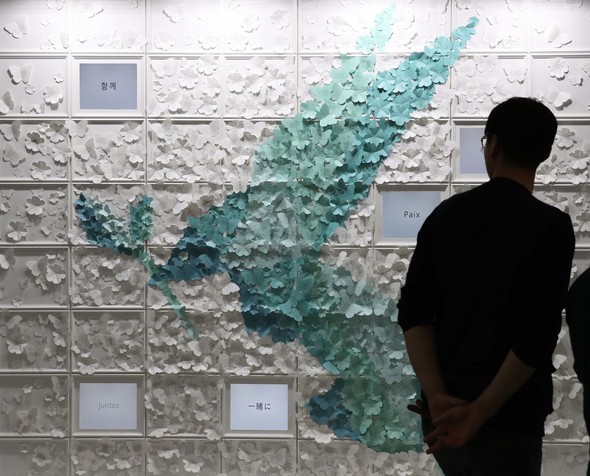 |
|
A paper dove sculpture created from messages in 43 different languages expressing the world’s wish for peace is displayed at the entrance to the Korea Exhibition Center in Goyang, Gyeonggi Province on Apr. 24. (by Kim Bong-gyu, staff photographer)
|
International sanctions on North Korea restrict economic cooperation projects that typified previous summit agreements
“There are currently many constraints on the inter-Korean summit. South and North cannot make any separate progress irrespective of the North Korea-US summit, nor are they able to make agreements beyond international sanctions. . . . It does seem clear, however, that we at least need to establish the momentum for dialogue to continue.” These remarks were made by President Moon Jae-in during an invitational luncheon for media company presidents at the Blue House on Apr. 19. At the time, the remarks were seen as a formality intended to quiet excessive media hopes for the upcoming Apr. 27 inter-Korean summit. They weren’t. Instead, the remarks encapsulated Moon’s heartfelt opinions and strategy regarding historic improvements in inter-Korean relations - the third of three main agenda items given by the Blue for the summit, alongside denuclearization of the Korean Peninsula and establishment of permanent peace. The “we at least need to establish the momentum for dialogue to continue” part was the key element. Moon based his determination primarily on the fact that stiffer sanctions by the UN and international community in response to North Korea’s nuclear and missile development programs have ruled out the possibility of the upcoming summit producing the kinds of large-scale economic cooperation projects that emerged from the first two inter-Korean summits in 2000 and 2007. This does not mean he is giving up on the idea of economic cooperation. Most government officials and experts agree that if the inter-Korean and North Korea-US summits get the ball rolling toward denuclearization, sanctions will be loosened as the agreements are implemented, which will raise the opportunity to discuss economic cooperation as a major agenda item at another future inter-Korean summit. It’s this position that has informed summit preparatory committee chairman Im Jong-seok’s repeated confirmations that economic cooperation “is not a major part of this summit’s agenda.” But Moon’s focus is not confined to the practical constraints that sanctions pose. His plan to propose establishing a liaison office at Panmunjeom and forming joint inter-Korean committee in various areas is aimed at laying the groundwork for realizing his longstanding goal of peaceful coexistence and shared prosperity for South and North – as witnessed in his declaration that the “ultimate goal is inter-Korean prosperity.” This approach is especially significant in its attempts to restore and actualize the system based on the 1991 Basic Agreement. Based on the results of senior-level inter-Korean talks, the Basic Agreement (Agreement on Reconciliation, Non-aggression and Exchanges and Cooperation between the South and the North) is the most comprehensive and concrete of the agreements reached by South and North Korean authorities at any time, including the first and second inter-Korean summits. It has been called a “canon” for peaceful inter-Korean coexistence – but it has been regarded as a dead letter after failure to implement its terms. An old Korean saying goes, “When you’ve tripped and fallen, use it to take a break.” Since there is no way of avoiding the constraints of sanctions, a better approach than wasting effort toward an agreement on new cooperative efforts might be to restore and actualize the Basic Agreement system and achieve progress in establishing regular, ongoing, permanent dialogue to keep inter-Korean relations on a solid footing. That’s the essence of Moon’s message about establishing momentum for continued dialogue. North Korea’s painful memory of the 1991 Basic Agreement But for North Korea, the Basic Agreement is a painful memory. While it has stressed the importance of the July 4 Joint Statement of 1972, the June 15 Joint Declaration of 2000, and the October 4 Summit Declaration of 2007 as major inter-Korean agreements, it has avoided mentioning the Basic Agreement. Pyongyang remembers that agreement as a defensive decision it made to protect its regime and avoid being absorbed into the South as the former Soviet republics and other “existential socialist states” were adopting new regimes in the early 1990s. Even after the Roh Tae-woo administration’s early-’90s proposal to establish a permanent Seoul-Pyongyang liaison mission was reduced to the creation of a Panmunjeom liaison office, that office’s functions were downgraded to the level of a direct phone line. Similarly, the suspension of joint political, military, and economic committees as permanent meeting groups between inter-Korean authorities after just a few meetings was due in some part to Pyongyang’s half-hearted attitude. But the administration and experts have concluded that as Moon’s counterpart in the talks, Kim Jong-un actually would like to reconfigure inter-Korean relations as a normal relationship between two sovereign states – unlike his father and grandfather with their constant calls for “reunification of the fatherland.” United Front Department director Kim Yong-chol, who has played a key role working on behalf of Kim Jong-un to prepare for the inter-Korean and North Korea-US summits with Moon’s representative, National Intelligence Service director Suh Hoon, was a member of the North Korean delegation to the senior-level inter-Korean talks in the 1990s. Shortly after the Basic Agreement’s adoption, Kim Yong-chol reportedly complained that the document was “yours [South Korea’s], not ours.” But a quarter-century has passed since then – and, most importantly, the top leader is hewing to a different position. A former senior administration official sounded a hopeful note on Apr. 24, predicting that “if an agreement is reached at the summit to establish a liaison office at Panmunjeom, that will be a historic achievement on par with any agreement from the first or second summits.” By Lee Je-hoon, staff reporter Please direct questions or comments to [english@hani.co.kr]






